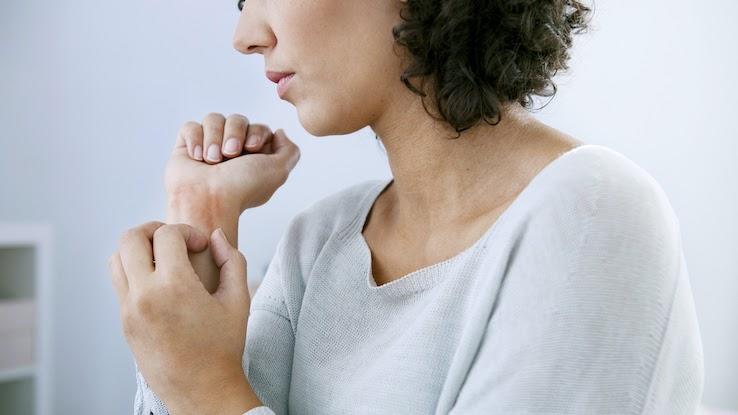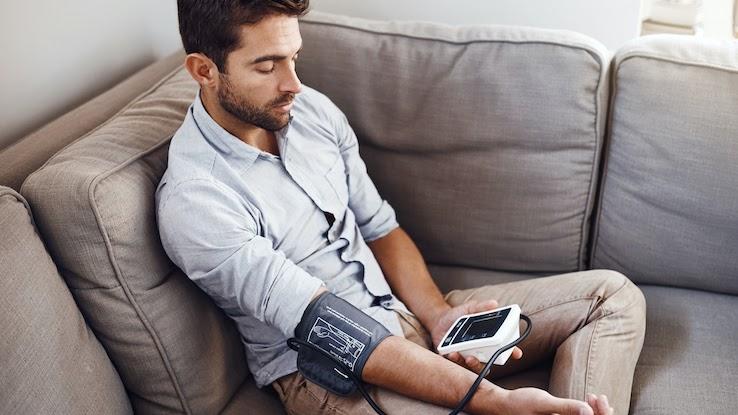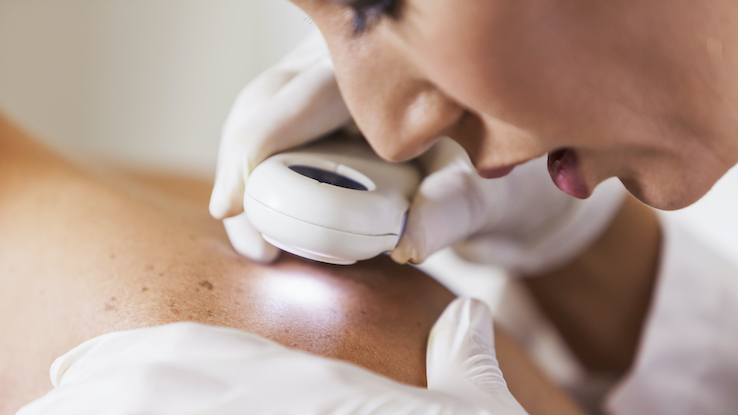Upload Picture of Skin Condition and Get Opinion
Skin Weather condition: Understanding Psoriasis Signs, Symptoms and Treatments

Psoriasis is a skin condition that affects approximately three% of the U.S. population. It'south characterized most commonly by the appearance of dry, thickened pare patches. This chronic condition is not contagious, meaning it can't be transmitted from one person to another. Scientists believe psoriasis is an autoimmune status, which means information technology occurs due to a person's overactive allowed system attacking their torso's ain healthy cells.
Psoriasis is by and large diagnosed past a dermatologist (a doctor who specializes in skin conditions) considering they tin differentiate between this condition and others it may be normally confused with, such as eczema. While at that place is no cure for this status, people with psoriasis can manage their symptoms with a variety of treatment options. Baronial is Psoriasis Awareness Month. Now is the prime time to educate yourself about this condition.

There are several subtypes of psoriasis: plaque psoriasis, guttate psoriasis, inverse psoriasis, nail psoriasis, erythrodermic psoriasis, pustular psoriasis and psoriatic arthritis. Each subtype varies in presentation and severity. Additionally, the severity of this status may vary profoundly from person to person. A dermatologist tin accurately place which subtype of psoriasis yous accept and ensure you receive the most appropriate treatment for it.
Plaque psoriasis is the most common form of psoriasis. It causes thick, raised patches of skin known as "plaques" to form. The plaques may exist covered by scales, which appear every bit sparse, argent-white pieces of pare. Plaques may differ in size and tend to occur in clusters. Nigh commonly, these plaques are found on the elbows, knees, scalp and lower back expanse.
Guttate psoriasis is characterized past small, reddish-pink bumps that arise all of a sudden and typically affect large areas of the trunk, arms and legs. This type of psoriasis occurs more commonly in children and young adults following an infection such equally strep throat. Guttate psoriasis tends to articulate itself inside several weeks or months and mostly doesn't require handling. In some cases, the condition never returns; however, in others, it can flare again later in life.
Inverse psoriasis occurs about usually in areas of skin-to-pare contact, such as the underarm region, genitals and area between the buttocks. It'south characterized by red, raw-appearing skin that'southward sore and, in some cases, painful to the affect. This form of psoriasis is likewise known equally intertriginous or flexural psoriasis.
Pustular psoriasis tin can be generalized (affecting large areas of the body) or localized (affecting only certain areas). Generalized pustular psoriasis is known to worsen quickly and can crusade fever, chills, sweating, severe itching and muscle weakness. Localized pustular psoriasis affects the palms of the hands and the soles of the feet.
Erythrodermic psoriasis causes thick, red and inflamed patches that encompass most of the peel. This type of psoriasis is considered a medical emergency and requires firsthand treatment. People who develop erythrodermic psoriasis may already accept another subtype of psoriasis. However, it's particularly life-threatening because it tin crusade hypothermia by preventing pare from retaining warmth. Other symptoms include body chills, fever, tachycardia (fast pulse), severe itching, muscle weakness and skin that appears burned due to the extent of the inflammation.
Blast psoriasis often accompanies psoriasis in other regions of the body. It's estimated that half of people with plaque psoriasis run across boom symptoms, such as small dents in the blast, discoloration below the nail, smash lifting or brittle and rough nails.
Psoriasis can also impact a person's joints in a condition that's known as psoriatic arthritis. This form of psoriasis occurs most normally alongside astringent peel psoriasis. It's characterized by joint hurting, swelling around the joints (particularly the talocrural joint and heel areas) and stiffness that feels worse in the morning.
Signs and Symptoms of Psoriasis

Symptoms of psoriasis vary past subtype and may present in many ways. They may unremarkably look like:
- Thickened areas of dry out pare that appear ruddy or pink
- Itchy, flaky or scaly areas
- Small, reddish-pink bumps
- Clusters of thickened, rash-similar patches on the elbows, knees, ears or scalp
- Flaky skin on the scalp
- Nail aging or discoloration
More one area of the body tin can develop symptoms at the aforementioned time. These symptoms tin can develop slowly or of a sudden. Scratching or aggravating the pare may worsen symptoms of irritation.
When outbreaks occur, they tend to vary in severity. Rashes may appear on a person's back, buttocks, arms, legs, underarms, tummy, genital area, face or joints. Headache, fever, chills and extreme pain might back-trail the rash(es). Chief and accompanying symptoms may vary from person to person. Someone who has had a psoriasis flare in the past may be able to predict when another flare is likely to occur due to their experience with the symptoms.
Typically, psoriasis cycles through flare-ups and periods of remission that tin can final anywhere from days to months. Some cases are astringent, while others are subtle. In some cases, the rashes articulate on their own, leaving no remainder scarring backside. In some more than astringent cases, however, the condition may recur throughout a person's lifetime.
Sometimes people confuse psoriasis with allergic reactions, other rashes or sexually transmitted diseases, but a dermatologist can help rule out these other conditions. For the nigh office, people with psoriasis will experience regular and unpredictable flare-ups that are followed by periods of remission.
Symptoms of psoriasis often start in a person's late teens to mid-twenties. Even with handling, it'south expected that people with psoriasis will have flare-ups throughout their lives.

There are several conditions related to and associated with psoriasis.
Autoimmune disease
Studies accept shown that people with one class of an autoimmune disease are likely to be susceptible to developing another. For example, both ulcerative colitis and Crohn's affliction are more than mutual in people with psoriasis compared to those without this specific skin status.
Cardiovascular disease
People with psoriasis may exist at an increased take chances of developing cardiovascular disease. This may be due to the fact that people with psoriasis take a higher incidence of obesity, diabetes and hypertension compared to the general population.
Certain forms of cancer
Inquiry has demonstrated that, in a group of 2,700 patients over the age of 65, patients with psoriasis had a three-fold increased risk of developing lymphoma than the general population. There's also some evidence that caucasian individuals who accept undergone multiple ultraviolet (UV) light treatments for psoriasis are at an increased take chances of developing melanoma (skin cancer).
Low
Psoriasis is associated with an increased prevalence of depression and other mood disorders. Many people with psoriasis written report feeling low self-esteem and a heavy psychological burden due to their condition, which can make them feel isolated or solitary. In some cases, these depressive symptoms tin atomic number 82 to suicidal ideations or thoughts. If you or someone you lot know is in immediate danger or having suicidal thoughts, telephone call the National Suicide Prevention Lifeline (1-800-273-8255).
Causes and Triggers of Psoriasis

While medical experts don't know the exact cause of psoriasis, they do know that the condition has immune and genetic components. The disorder is believed to be an autoimmune condition that's influenced by a genetic predisposition. Some scientists believe that psoriasis occurs when skin cells abound too rapidly. Others believe that symptoms occur when allowed cells release inflammatory signals, leading to the feature skin irritation seen in psoriasis.
Flare-ups are relatively unpredictable, and at that place may be no discernable environmental factors that trigger these flares. Once a person has their first outbreak, they're likely to develop another. While it is difficult to predict a outburst, there are certain environmental, dietary and behavioral factors that tin can potentially lead to or exacerbate psoriasis rashes. Many people with psoriasis feel flare-ups while undergoing periods of extreme stress. Others develop psoriasis afterward too much or too little lord's day exposure.
Certain medications, topical creams, makeup and hair products can increase the likelihood of a flare-up. In addition, those who fume cigarettes, accept diabetes or have hypertension are also at an increased adventure of developing psoriasis. Some people find that they tend to have more frequent flare-ups when their skin is dry rather than moisturized.
Many people who develop psoriasis accept a family history of the condition, indicating a strong genetic component. Unfortunately, there are no tests that tin point whether you lot will develop psoriasis in your lifetime. Documenting your behaviors tin can aid determine what your personal triggers may be for a psoriasis flare-up.
Diagnosing Psoriasis

Psoriasis is typically diagnosed visually past a skin specialist or dermatologist. Your dermatologist may utilize an evaluation known as the Psoriasis Area and Severity Index (PASI) to measure the overall severity of your condition. Blood and urine tests may be required to rule out other conditions. Information technology is recommended y'all examine your own pare regularly to notice any changes or persistent skin issues.
Visual Test
There are no lab tests or claret tests available to confirm or deny the presence of psoriasis. Instead, a doctor must examine the skin and nails closely, sometimes analyzing the skin under a microscope. A chief care physician may be able to diagnose psoriasis. However, your dr. may choose to refer you lot to a dermatologist or other specialist for a more precise diagnosis.
Skin Biopsy
Your physician may take a pocket-sized sample of skin from an afflicted expanse to rule out other possible peel conditions, sexually transmitted diseases or infections. A peel biopsy generally does non require any course of pain management other than a local anesthetic. It tin can ordinarily be done in an outpatient setting.
It'south important to tell your physician if you're taking any medications prior to having a peel biopsy, every bit sure medications can change the appearance of your pare under a microscope. You may also undergo an allergy test to determine whether your rash is the result of an allergic reaction to a nutrient, plant, animate being or another kind of mutual environmental trigger.
Laboratory Testing
Psoriasis cannot be confirmed by a blood or urine test. However, a physician may gild lab piece of work to rule out other possible peel atmospheric condition, rashes or sexually transmitted diseases.
Psoriatic Arthritis
People with psoriatic arthritis usually experience joint swelling, pain and stiffness. Your physician may lodge a blood exam to detect rheumatoid factor (RF), which indicates the presence of rheumatoid arthritis. This claret examination may help your doc rule out other possible causes of your symptoms.
Imaging
Your physician may order an X-ray if you're demonstrating symptoms of arthritis such equally articulation pain and stiffness. An Ten-ray can help make up one's mind if long-term impairment has occurred to your basic due to your condition. The imaging alone cannot differentiate betwixt psoriatic arthritis and other forms of arthritis, only it can help your md build a complete pic of your condition.
Misdiagnosis
Psoriasis may be misdiagnosed due to its resemblance to conditions like acne, arthritis and sexually transmitted diseases. The status may go undetected until symptoms get present. Because symptoms vary greatly from person to person, it tin exist hard to determine a definitive list of psoriasis indicators. If you suspect you lot accept psoriasis, y'all should visit a dermatologist or skin specialist.
Psoriasis Flare-ups, Remission and Treatments

While in that location is no cure for psoriasis, several treatments tin can help convalesce your symptoms. Treatments are based on the severity and location of a person'due south rashes. A physician may prescribe a combination of topical creams, oral medications, biologics (injections) and ultraviolet radiation treatments.
What works for some people might not piece of work well for others. If you're diagnosed with psoriasis, it may take some time for your dr. to develop a handling strategy that offers you relief, and your physician may try out dissimilar treatments in steps and so as to not overwhelm your trunk. Near providers begin with topical creams or treatments that are practical directly to the peel. Then, they motility to more invasive treatments such as oral medications or phototherapy (UV handling).
If the disease is mild and affects only a pocket-sized area of skin, topical creams, moisturizers and sprays may be effective. For some people, the flare-ups may exist more astringent on some areas of the skin than others. Your doctor may recommend topical or injected steroids for effective, localized treatment. Hydrocortisone is a commonly prescribed cream and injection that helps relieve itching, called-for and swelling.
More than astringent cases of psoriasis may benefit from the use of biologics. These are medications that target certain components of the immune system. The use of light with phototherapy may besides lessen symptoms of moderate psoriasis. If psoriasis progresses to a life-threatening stage, as can happen with pustular or erythrodermic psoriasis, surgical intervention may be necessary to prevent further complications such as organ failure.
Resource Links:
https://www.aad.org/public/diseases/psoriasis/what/symptoms
https://world wide web.cdc.gov/psoriasis/alphabetize.htm
https://my.clevelandclinic.org/health/diseases/6866-psoriasis
https://www.jaad.org/commodity/S0190-9622(08)00273-9/fulltext
https://www.psoriasis.org/
https://www.psoriasis.org/steroids/
Source: https://www.symptomfind.com/health-conditions/psoriasis-condition?utm_content=params%3Ao%3D740013%26ad%3DdirN%26qo%3DserpIndex
Post a Comment for "Upload Picture of Skin Condition and Get Opinion"